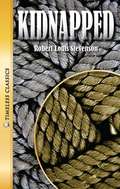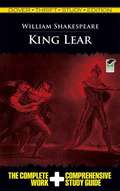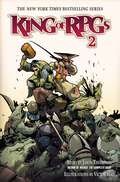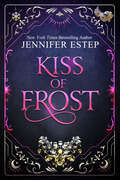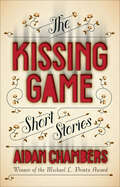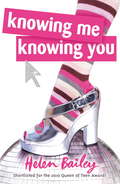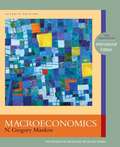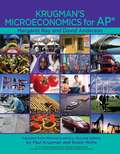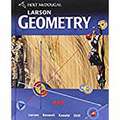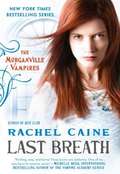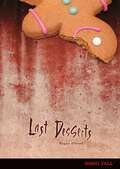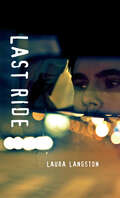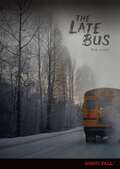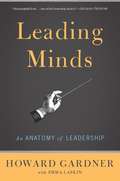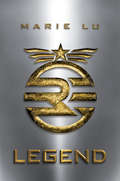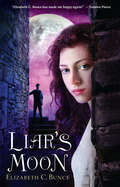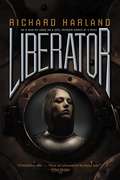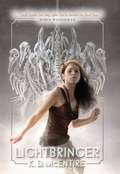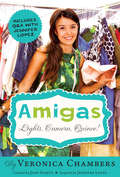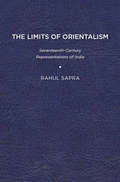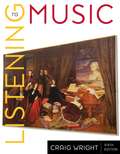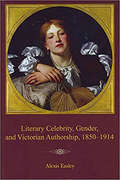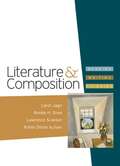- Table View
- List View
Kidnapped (Timeless Classics)
by Robert Louis Stevenson Janice GreeneOn the run from his kidnapper, an orphaned boy acquires an unexpected travelling companion. Is Alan Breck the notorious outlaw that people say he is? Or is he really a patriotic hero? This is the Timeless Classics version adapted by Janice Greene.
King Lear Thrift Study Edition
by William ShakespeareIncludes the unabridged text of Shakespeare's classic play plus a complete study guide that helps readers gain a thorough understanding of the work's content and context. The comprehensive guide includes scene-by-scene summaries, explanations and discussions of the plot, question-and-answer sections, author biography, analytical paper topics, list of characters, bibliography, and more.
King of RPGs 2
by Jason ThompsonRETURN TO WORLD OF WARFARE! After an intense World of Warfare (WOW) bender, college kid and hardcore gamer Shesh Maccabee finds himself completely consumed by his dark character, slayer extraordinaire Moggrathka. To avoid a repeat incident—and the potentially fatal consequences of getting whacked online—Shesh enmeshes himself in the real world with the help of a part-time job, focusing on paying tuition instead of slaying orcs. Meanwhile his archenemy, student cop Rona, is never far behind, watching and waiting for Shesh to lapse back into character and go on a rampage.Before you know it, he does just that, wreaking havoc across the WOW servers . . . and across campus. With Shesh&’s RPG-enabling gamemaster friend Theo feeding the fires of madness, WOW execs devise a plan to extinguish Moggrathka&’s virtual flame once and for all. The final showdown explodes at the world&’s biggest WOW convention, where top gamers gather to fight for supremacy. It&’s the ultimate battle between good, evil, and chaotic evil with the (virtual) lives of millions at stake!
Kiss of Frost (The\mythos Academy Ser. #2)
by Jennifer EstepA high school warrior-in-training gets lessons in surviving a mysterious assassin in the New York Times bestselling author&’s YA urban fantasy novel. I'm Gwen Frost, a second-year warrior-in-training at Mythos Academy, and I have no idea how I'm going to survive the rest of the semester. One day, I'm getting schooled in swordplay by the guy who broke my heart—the drop-dead gorgeous Spartan Logan Quinn who slays me every time. Then, an invisible archer in the Library of Antiquities decides to use me for target practice. And now, I find out that someone at the academy is really a Reaper bad guy who wants me dead. Now, with Logan&’s help, I&’ll have to learn to live by the sword—or die trying.
The Kissing Game: Short Stories
by Aidan ChambersIn this brand-new collection of short stories, Aidan Chambers explores moments of truth, when a character or an event suddenly reveals an often-surprising meaning: A girl loses her humanity when she takes a summer job as a theme-park character; a boy tries to save a girl from a fiery death, only to discover the same event happened one hundred years before. And the titular story, in which an innocent game takes a fatal turn, will haunt the reader for a long time. These provocative stories beautifully lend themselves to discussion, and once again Chambers treats us to his fiercely intelligent, finely crafted prose and his incisive understanding of the wonderings of young people on the verge of adulthood.
Knowing Me, Knowing You
by Helen BaileyChantelle 'Channy' Allen is just about enduring her slightly bored teenage existence - trying not to die of embarrassment every time her parents' Abba tribute band perform a cringing medley of hits in front of all her friends...But then Channy finds out something that turns her world upside down; something that makes perfect sense, but at the same time seems utterly ridiculous. Something that Channy is intent on investigating - despite the distraction of gorgeous French exchange student Antoine.Channy's about to learn a valuable life lesson: sometimes curiosity is a dangerous thing...
Krugman's Macroeconomics for AP
by Margaret Ray David A. AndersonMargaret Ray and David A. Anderson, with the help of AP Economics teachers have combined 35 years of work on AP Economic students, having experienced the challenges, concerns, and solutions that have worked to improve the study of macroeconomics. With the intention of promoting effective and efficient the course, this book presents an approach that would facilitate high quality learning in AP Economics course for all students.
Larson Geometry
by Holt McdougalIn this book, you will develop reasoning and problem solving skills as you study topics such as congruence and similarity, and apply properties of lines, triangles, quadrilaterals, and circles. You will also develop problem solving skills by using length, perimeter, area, circumference, surface area, and volume to solve real-world problems.
Last Breath (Morganville Vampires #11)
by Rachel CaineThere is a question Claire has long been asking: why do vampires live so far out in a sunny desert when they're sensitive to sunlight? The reason doesn't have to do with sunlight but water - and an ancient enemy who has finally found a way to invade the vampires' landlocked community. Vampires aren't the top predator on earth. There's something worse that preys on them. . . something much worse. Which means if Claire, and Morganville, want to live, they will have to fight on to the last breath. 'A first-class storyteller who can deal out amazing plot twists as though she was dealing cards. ' - Charlaine Harris, bestselling author of the Sookie Stackhouse novels.
Last Desserts (Night Fall ™)
by Megan AtwoodElla loves to practice designs for the bakery she'll someday own. She's also one of the few people not to try the cookies and cakes made by a mysterious new baker. Soon, the people who ate the baker's treats start acting oddly, and Ella wonders if the cookies are to blame. Can her baking skills help save her best friend—and herself?
Last Ride (Orca Soundings)
by Laura LangstonHe killed his best friend, Logan, in a street-racing accident a year ago. As he tries to make amends to Logan's girlfriend and keep his promise to never race again, Tom is haunted by his dead friend. He thinks Logan is trying to tell him something. Not only that, since he faces huge medical bills from the accident and may have to give up his car, the pressure to race is almost unbearable.
The Late Bus (Night Fall ™)
by Richard ReeceLamar takes the "late bus" home from school after practice each day. After the bus's beloved driver passes away, Lamar begins to see strange things—demonic figures, preparing to attack the bus. Soon he learns the demons are after Mr. Rumble, the freaky new bus driver. Can Lamar rescue his fellow passengers, or will Rumble's past come back to destroy them all?
Leading Minds: An Anatomy Of Leadership
by Howard Gardner Emma LaskinPsychologist Howard Gardner, creator of the multiple intelligences framework and author of many books on the mind, explores the major facets of leadership from the perspective of psychology. In this work for general readers (first published in 1995), he presents a framework for understanding leadership and illustrates the framework with profiles of famous leaders such as anthropologist Margaret Mead, civil rights leader Martin Luther King, Jr. , Pope John XXIII, and Mahatma Gandhi. The book is illustrated with b&w historical photos of leaders. This edition contains a new preface by Gardner reviewing his reasons for writing the book, offering reflections on the past 15 years in leadership studies, and commenting on how leadership has changed in the era of "truthiness, twaddle, and Twitter. " Annotation ©2012 Book News, Inc. , Portland, OR (booknews. com)
Legend (Legend #1)
by Marie LuWhat was once the western United States is now home to the Republic, a nation perpetually at war with its neighbors. Born into an elite family in one of the Republic's wealthiest districts, fifteen-year-old June is a prodigy being groomed for success in the Republic's highest military circles. Born into the slums, fifteen-year-old Day is the country's most wanted criminal. But his motives may not be as malicious as they seem.<P><P> From very different worlds, June and Day have no reason to cross paths - until the day June's brother, Metias, is murdered and Day becomes the prime suspect. Caught in the ultimate game of cat and mouse, Day is in a race for his family's survival, while June seeks to avenge Metias's death. <P> But in a shocking turn of events, the two uncover the truth of what has really brought them together, and the sinister lengths their country will go to keep its secrets.Full of nonstop action, suspense, and romance, this novel is sure to move readers as much as it thrills.
Liar's Moon
by Elizabeth C. BuncePrisons, poisons, and passions combine in a gorgeously written fantasy noir by the author of the Morris Award-winning A Curse Dark As Gold.As a pickpocket, Digger expects to spend a night in jail every now and then. But she doesn't expect to find Lord Durrel Decath there as well--or to hear he's soon to be executed for killing his wife. Durrel once saved Digger's life, and when she goes free, she decides to use her skills as a thief, forger, and spy to investigate his case and return the favor. But each new clue only opens up more mysteries. While Durrel's marriage was one of convenience, his behavior has been more impulsive than innocent. His late wife had an illegal business on the wrong side of the civil war raging just outside the city gates. Digger keeps finding forbidden magic in places it has no reason to be. And it doesn't help that she may be falling in love with a murderer . . .
Liberator (Worldshaker #2)
by Richard HarlandEquality remains elusive in this stunning steampunk sequel to Worldshaker.In the aftermath of the events of Worldshaker, the Filthies control the massive juggernaut, now called Liberator. Many members of the former upper class, called Swanks, have remained behind to help teach them how to operate the juggernaut and to build a new society together. But all is not idyllic aboard Liberator.A saboteur seems determined to drive up anti-Swank sentiment among the more volatile Filthy factions. And the Swanks are finding that their best efforts to work with the Filthies are being tossed aside. Even Col, who thought his relationship with Riff was rock solid, is starting to see their friendship crumbling before him. As tensions run high and coal supplies run low, Liberator is on the verge of a crisis. Can Col and Riff unify their divided people before disaster strikes?
Lightbringer (Lightbringer #1)
by K. D. McentireA YA urban fantasy/romance set in a world a breath away from our own. Similar in tone to Tithe and Unleashed, this story tiptoes down the line between love and horror as Wendy discovers herself and the darkest parts of the afterlife. Wendy has the ability to see souls that have not moved on-but she does not seek them out. They seek her. They yearn for her . . . or what she can do for them. Without Wendy's powers, the Lost, the souls that have died unnaturally young, are doomed to wander in the never forever, and Wendy knows she is the only one who can set them free by sending them into the light. Each soul costs Wendy, delivering too many souls would be deadly, and yet she is driven to patrol, dropping everyone in her life but her best friend, Eddie-who wants to be more than friends-until she meets Piotr. Piotr, the first Rider and guardian of the Lost, whose memory of his decades in the never, a world that the living never see, has faded away. With his old-fashioned charms, and haunted kindness, he understands Wendy in ways no one living ever could, yet Wendy is hiding that she can do more than exist in the never. Wendy is falling for a boy who she may have to send into the light. But there are darker forces looking for the Lost. Trying to regain the youth and power that the Lost possess, the dark ones feed on the Lost and only Wendy and Piotr can save them-but at what cost?
Lights Camera Quince! (Amigas #2)
by Veronica ChambersAmigas is officially open for business! Alicia, Jamie, Carmen and Gaz managed to throw an amazing quince for their new friend Sarita. But now that they are sophomores AND in the quince planning business, things are going to get more complicated. Luckily, one of their own is having a quince. Carmen is turning fifteen and the rest of the friends are determined to throw her the best party ever. But in Miami, the heat is always on--and so is the drama. When the group is asked to take part in a reality show featuring quinceanera parties, they all jump at the chance. But being under the spotlight brings out the true colors of the group and before anyone can even cry "action!", Alicia is fighting with Gaz, Carmen is worrying about her vows, and Jamie is feeling left out. With the cameras rolling, will Carmen's party go up in flames?
The Limits of Orientalism: Seventeenth-Century Representations of India
by Rahul SapraThe Limits of Orientalism: Seventeenth-Century Representations of India challenges the recent postcolonial readings of European, predominantly English, representations of India in the seventeenth century. Following Edward Said’s discourse of “Orientalism,” most postcolonial analyses of the seventeenth-century representations of India argue that the natives are represented as barbaric or exotic “others,” imagining these representations as products of colonial ideology. Such approaches tend to offer a homogeneous idea of the “native” and usually equate it with the term “Indian.” Sapra, however, argues that instead of representing all natives as barbaric “others,” the English drew parallels, especially between themselves and the Mughal aristocracy, associating with them as partners in trade and potential allies in war. While the Muslims are from the outset largely portrayed as highly civilized and cultured, early European writers tended to be more conflicted with Hindus, their first highly negative views undergoing a transformation that brings into question any straightforward Orientalist reading of the texts and anticipates the complexity of later representations of the indigenous peoples of the sub-continent. Sapra’s theoretical and methodological approach is influenced by such writers as Aijaz Ahmad and Denis Porter, who have highlighted powerful alternatives to Said’s discourse of “Orientalism.” Sapra historicizes European representations of the indigenous to draw attention to the contrasting approaches of the Portuguese, the Dutch and the English in relation to seventeenth-century India, effectively undermining comfortable notions of a homogenous “West.” Unlike the Portuguese, for whom the idea of a dynasty and the conversion of heathens went hand in hand with the idea of trade, for the Dutch and the English the primary consideration was commercial. In keeping with the commercial approach of the English East India Company, most English travelers, instead of representing the Muslims as barbaric “others,” highlight the compatibility between the two cultures and consistently praise the Mughal empire for its religious tolerance. In the representations of the Hindus, Sapra demonstrates that most writers, even while denigrating the Hindu religion, appreciate the civilized society of the Hindus. Moreover, in the representations of sati or widow-burning, a distinction needs to be made between the patriarchal and the Orientalist points of views, which are at variance with each other. The tension between the patriarchal and the Orientalist positions challenges Gayatri Chakravorty Spivak’s analysis of sati in “Can the Subaltern Speak?” which has become the standard model for most postcolonial appraisals of European representations of sati. The book highlights the lacuna in postcolonial readings by providing access to selections of commonly unavailable early-modern writings by Thomas Roe, Edward Terry, Henry Lord, Thomas Coryate, Alexander Hamilton and other the records of the East India Company, which makes the book vital for students of theory, European and South-Asian history, and Renaissance literatures. Published by University of Delaware Press. Distributed worldwide by Rutgers University Press.
Listening to Music
by Craig WrightDesigned for an introductory course in music appreciation, this lavishly illustrated textbook encourages students to become active listeners who engage personally with what they are hearing. Sound files for the listening exercises are contained on the two accompanying CDs. Wright teaches music at Yale U. Annotation ©2007 Book News, Inc. , Portland, OR (booknews. com)
Literary Celebrity, Gender, and Victorian Authorship, 1850-1914
by Alexis EasleyThis study examines literary celebrity in Britain from 1850 to 1914. Through lively analysis of rare cultural materials, Easley demonstrates the crucial role of the celebrity author in the formation of British national identity. As Victorians toured the homes and haunts of famous writers, they developed a sense of shared national heritage. At the same time, by reading sensational accounts of writers’ lives, they were able to reconsider conventional gender roles and domestic arrangements. As women were featured in interviews and profiles, they were increasingly associated with the ephemerality of the popular press and were often excluded from emerging narratives of British literary history, which defined great literature as having a timeless appeal. Nevertheless, women writers were able to capitalize on celebrity media as a way of furthering their own careers and retelling history on their own terms. Press attention had a more positive effect on men’s literary careers since they were expected to assume public identities; however, in some cases, media exposure had the effect of sensationalizing their lives, bodies, and careers. With the development of proto-feminist criticism and historiography, the life stories of male writers were increasingly used to expose unhealthy domestic relationships and imagine ideal forms of British masculinity. The first section of Literary Celebrity explores the practice of literary tourism in Victorian Britain, focusing specifically on the homes and haunts of Charles Dickens, Christina Rossetti, George Eliot, Elizabeth Barrett Browning, and Harriet Martineau. This investigation incorporates analysis of fascinating cultural texts, including maps, periodicals, and tourist guidebooks. Easley links the practice of literary tourism to a variety of cultural developments, including nationalism, urbanization, spiritualism, the women’s movement, and the expansion of popular print culture. The second section provides fresh insight into the ways that celebrity culture informed the development of Victorian historiography. Easley demonstrates how women were able to re-tell history from a proto-feminist perspective by writing contemporary history, participating in architectural reform movements, and becoming active in literary societies. In this chapter she returns to the work of Harriet Martineau and introduces a variety of lesser-known contributors to the field, including Mary Gillies and Mary Ward. Literary Celebrity concludes with a third section focused on the expansion of celebrity media at the fin de siècle. These chapters and a brief coda link the popularization of celebrity news to the de-canonization of women writers, the professionalization of medicine, the development of the open space movement, and the institutionalization of English studies. These investigations elucidate the role of celebrity media in the careers of Charlotte Robinson, Marie Corelli, Mary Braddon, Harriet Martineau, Thomas Carlyle, Ernest Hart, and Octavia Hill. Published by University of Delaware Press. Distributed worldwide by Rutgers University Press.
Literature: Texas Treasures (American Literature)
by Jeffrey D. Wilhelm Douglas Fisher Beverly Ann Chin Jacqueline Jones RoysterCollection of non-fiction, fiction and poetry.
Literature & Composition: Reading, Writing, Thinking
by Carol Jago Renée H. Shea Lawrence Scanlon Robin Dissin AufsesFrom Carol Jago and the authors ofThe Language of Compositioncomes the first textbook designed specifically for the AP* Literature and Composition course. Arranged thematically to foster critical thinking,Literature and Composition: Reading • Writing • Thinkingoffers a wide variety of classic and contemporary literature, plus all of the support students need to analyze it carefully and thoughtfully. The book is divided into two parts: the first part of the text teaches students the skills they need for success in an AP English Lit course, and the second part is a collection of thematic chapters of literature with extensive apparatus and special features to help students read, analyze, and respond to literature at the college level. OnlyLiterature and Compositionhas been built from the ground up to give AP students and teachers the materials and support they need to enjoy a successful and challenging AP English Literature and Composition course. #xA0; Use the navigation menu on the left to learn more about the selections and features inLiterature and Composition: Reading • Writing • Thinking.
The Little, Brown Handbook (High School Version)
by H. Ramsey Fowler Jane E. AaronThe handbook can help students build the writing skills they need to prepare for college-level coursework in many disciplines like developing paragraphs, punctuate quotations, write a college-application essay etc.
